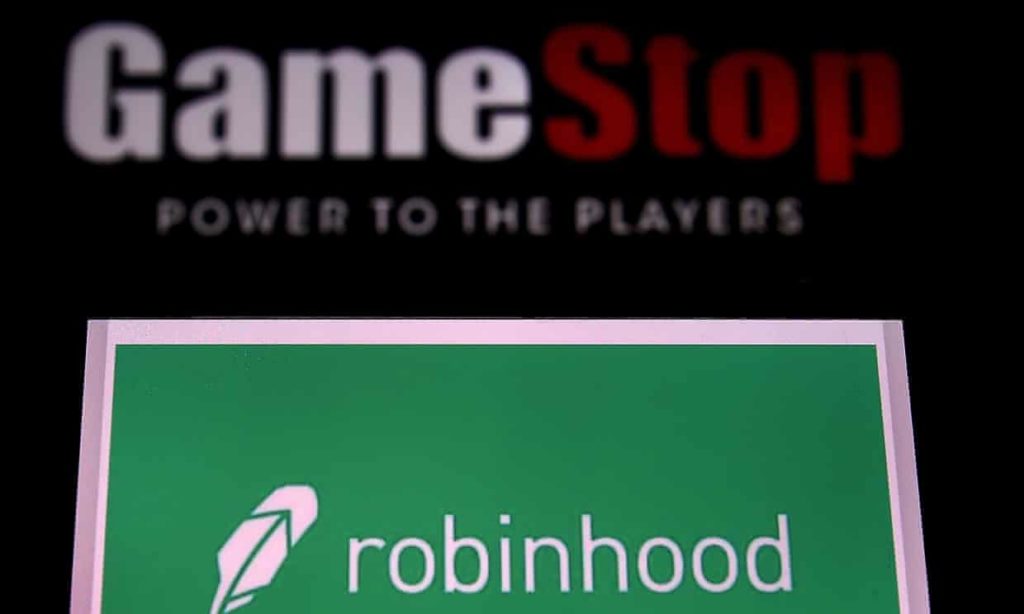Investment platform Robinhood has been hit with a class action lawsuit in the US after it prevented people buying shares in GameStop and some other companies that had seen big swings in prices and a high volume of trading.
Scores of amateur investors cried foul, suggesting Robinhood had acted against the interests of ordinary investors to help financial firms that had bet against GameStop and did not want to see its price go up any further.
Shares in GameStop, Nokia and AMC fell sharply after trading was suspended, resulting in losses, on paper at least, for some traders who had backed the stocks.
Is this really a conspiracy against average Joe investor, or is there a more mundane explanation?


RH breached its fiduciary responsibility to look after its retail clients after it emerged it came under pressure from Citadel and The White House to help the short-sellers (Citadel being one) by artificially crashing the price of $GME and other stocks. RH only stopped buying instead of pausing all trading in tickers like $GME. Multiple lawsuits have been filed accusing them of illegal market manipulation.
By stopping new purchases with loaned money (trades on margin), but allowing sales, RH could balance their deficit at the end of day tallies. They have a deficit because RH own the stocks bought on margin to speed the processing, not the traders. They loan you the funds to complete the transaction. Behind the scenes of margin trading is lending between various other parties (Market Makers, Clearing Houses…), creating counterparty risk if Peter fails to pay Paul – insolvency ensues.
RH didn’t have enough spare capital (liquidity) to afford the trading volumes, being already in default. With instant settlement and most accounts margin trading, RH needs a lot more capital to send to execute all trades. Without the large loan last week, they would have been insolvent.
This would have been a nightmare for all the retail margin accounts as millions of traders would have lost all their money and become another creditor in bankruptcy. Increasing margin to 100% would have covered themselves if they weren’t relying on last minute adjustments according to modern portfolio theory. Halting trading activity would have stemmed the flow but may not have been enough to save RH from bankruptcy.
Cash accounts don’t carry the same risk but clearing takes two days allowing adequate time for the transaction to complete the loop and the funds to return to RH. Cash allows functionally liquid back systems. Margin does not during periods of high volume.
RH, in only allowing selling, caused panic and the price to crash. There is a conflict of interest here since Citadel was exposed to GME price rising further, and Citadel pays RH a small fee as e-broker for each share transaction that is routed through them. Citadel alone buying RH’s order book equates to 40% of RH’s revenues. The same Citadel that shorted GME stock, and bailed out Melvin Capital last Monday. Citadel can see RH’s order flow (pending trade activity) and can front run retail clients’ trades, making tiny amounts on each transaction, but leaving you with a slightly worse execution price. Millions of orders provide big data they use against you in collusion with hedge funds. Usually not an issue, until now.

Let me be clear and explicit; I fully condone and back what the Redditors are doing. Clever people online have found a hole in the free market, and used it to gain an advantage.
Their motives for doing so is a subject of discussion, but legally they’re doing nothing wrong. Robinhood is wrong for interfering, and by doing so they have highlighted where their loyalties lie; with the elites.
There are three main perspectives from which to view this situation; financial, class and Big Tech intervention. The three are broad enough in their own right to each have a conversation, but they are closely linked. The situation with Robinhood has raised questions and debates around these three topics, and has had unexpected results and unlikely alliances.
Redditors are surely within their rights to exploit the market in the way they have done. Although it sounds harsh and inhumane to say, the free market does not care about morals or empathy. Trading is a ruthless and unforgiving business and it’s all about getting ahead.
Redditors simply found a way to make money legitimately and did so, albeit at the expense of short sellers. Some may argue that this is immoral, but that’s how the industry works.
Short sellers have made billions off accelerating the process of failing businesses by betting against shares to decrease their value. They have treated businesses, big and small alike, as a kind of institutional casino; pawns in a get-rich-quick scheme.
If such a market is legal, then why shouldn’t investing be? If anything it’s more reasonable for investors to expect a return on their investments, rather than making money off failing businesses.
It’s also ironic that the short sellers who complain about losing significant capital kept silent when they profited off businesses who were also losing capital. Redditors have simply (and legally) beaten Wall Street at its own game, and they don’t like it.
For Robinhood to stop sellers from buying more stock in Gamestop is an attempt to enforce a status quo, which says that only specific people are allowed to be rich and wealthy. It’s classist and yet another way by which Big Tech companies are attempting to control every aspect of human life.
The only people angry about this are those with money to lose. People on both ends of the political spectrum and different classes have united in their outrage. Even Elon Musk has encouraged investors to make the most of this situation.
The ‘little guy’ has become successful, and it angers the rich elites. Good. More power to them.


